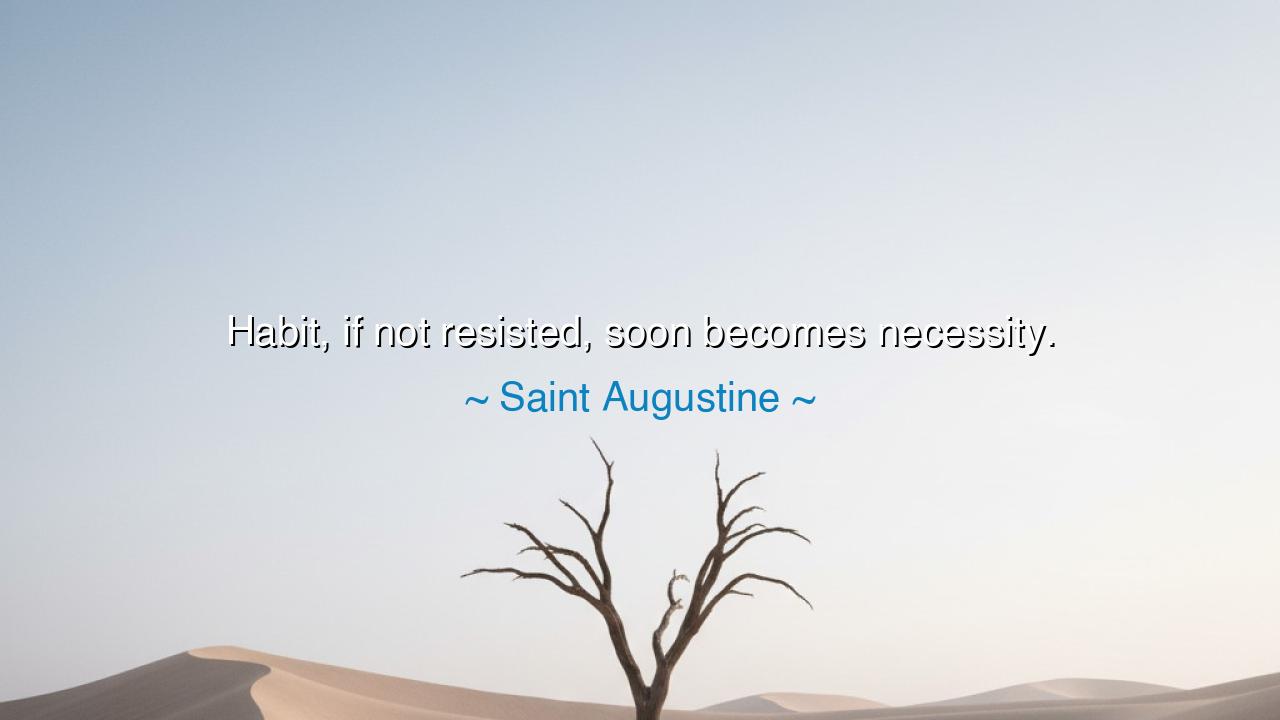
Habit, if not resisted, soon becomes necessity.






Habit is a subtle master, creeping silently into the soul. When Saint Augustine declared, “Habit, if not resisted, soon becomes necessity,” he spoke of the hidden chains that bind men and women. A small action, repeated again and again, gains strength until it no longer feels like a choice but a command. What begins as a mere indulgence or custom can grow into a prison, shaping our lives and even our destinies. Thus, Augustine warns that to preserve freedom of spirit, one must confront harmful habits before they take root and enslave the will.
This wisdom was born from Augustine’s own life. Before becoming one of the greatest Christian philosophers, he lived a life of indulgence and worldly pleasure. He knew the battle within the heart, where desire hardens into routine, and routine into addiction. His confession that “habit becomes necessity” was not theoretical—it was drawn from the furnace of his own struggles. In speaking these words, Augustine sought to guide future generations away from the same snares that once ensnared him.
History offers many vivid examples of this truth. Consider the fall of the Roman Empire. Rome’s early strength lay in its discipline and simplicity, but over time, a habit of luxury and excess took hold. Gladiatorial games, political corruption, and endless feasts became not just pastimes but necessities of Roman life. When disaster struck, the empire was too weakened by its habits to resist decay. What began as harmless pleasures became chains that dragged a mighty civilization to its knees.
On a personal level, this teaching is equally profound. The one who surrenders daily to anger, fear, or idleness soon finds these forces ruling his life. A person may tell himself, “It is only this once,” but each repetition builds an invisible wall around the soul. In time, the habit feels as inevitable as breathing, and the strength to resist seems lost. This is why Augustine calls for vigilance: to battle small weaknesses before they grow into unbreakable bonds.
Yet, there is hope in this wisdom. Just as harmful habits can enslave, virtuous habits can liberate. A man who cultivates daily acts of kindness, courage, or prayer will find these, too, becoming necessities—only this time, they bind him to greatness rather than ruin. By consciously choosing his habits, a person shapes his character and, ultimately, his destiny. Resistance, therefore, is not merely about denial, but about replacing darkness with light.
Let this teaching be carried through the ages: beware the quiet power of habit, for it shapes the unseen pathways of the soul. Resist the harmful while it is still weak, and nurture the good until it grows mighty. For in the end, what you repeat, you become—and what becomes necessity will rule your life as surely as any king or tyrant.






.ᰔ. ᰔᩚɑռɦ亗ɦυყᰔᩚ
I totally agree with this quote, but it also makes me wonder: how do we know when to push through a habit and when to let it go? Some habits, like exercising regularly, can be tough to keep up with, but the benefits are clear. But what about habits that are negative or self-destructive? How do we recognize when a habit is no longer just a choice but a force that's controlling us?
TA05 - Pham Tuan Anh
This quote makes me wonder if we ever truly have free will when it comes to habits. If they become necessities, do we lose our autonomy? I think about how people try to break free from destructive habits, and it feels like a constant struggle. Is it possible to completely change a deeply ingrained habit, or are we always going to feel like we're battling against something that’s part of us now?
THNguyen Thu Ha
Saint Augustine’s words are a sharp reminder of the power of habits, both good and bad. It’s crazy how something that begins as a simple routine can turn into something we feel we can’t live without. Do we ever really choose our habits, or do they just take over? How do we break free from the ones that no longer serve us? And why is it so hard to resist a habit once it starts feeling like a necessity?
TNTruong Thao Nguyen
This quote really makes me think about how easily we can fall into routines without realizing the long-term impact. Habits can start as small choices, but over time they can shape our lives in ways we never intended. Is there a point where a habit stops being a choice and starts being a necessity? How do we regain control over our habits once they’ve become ingrained in our daily lives?